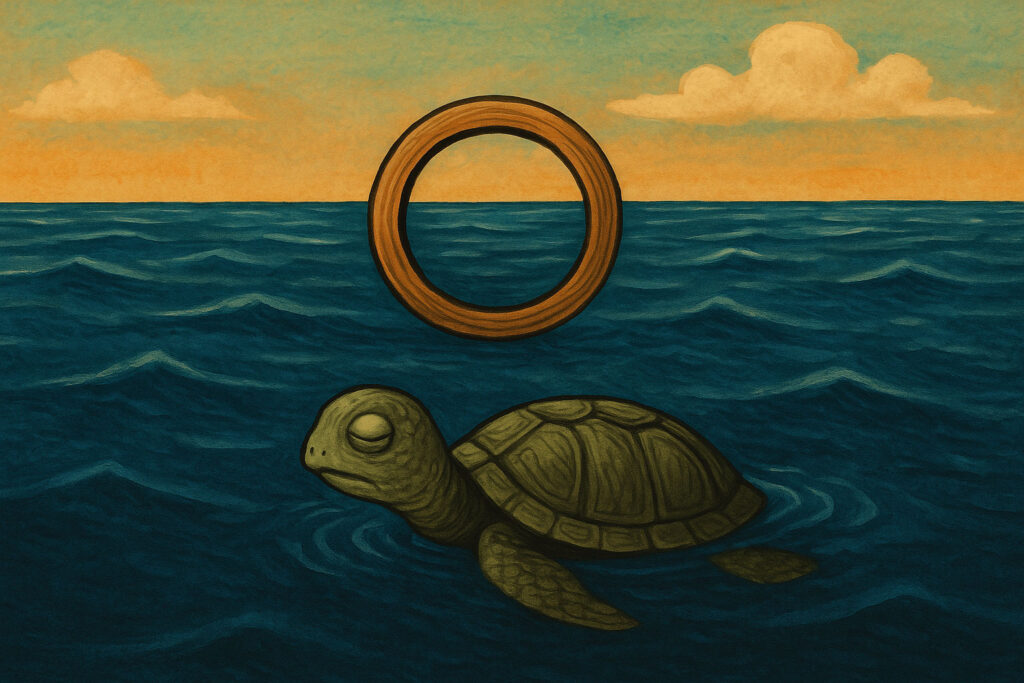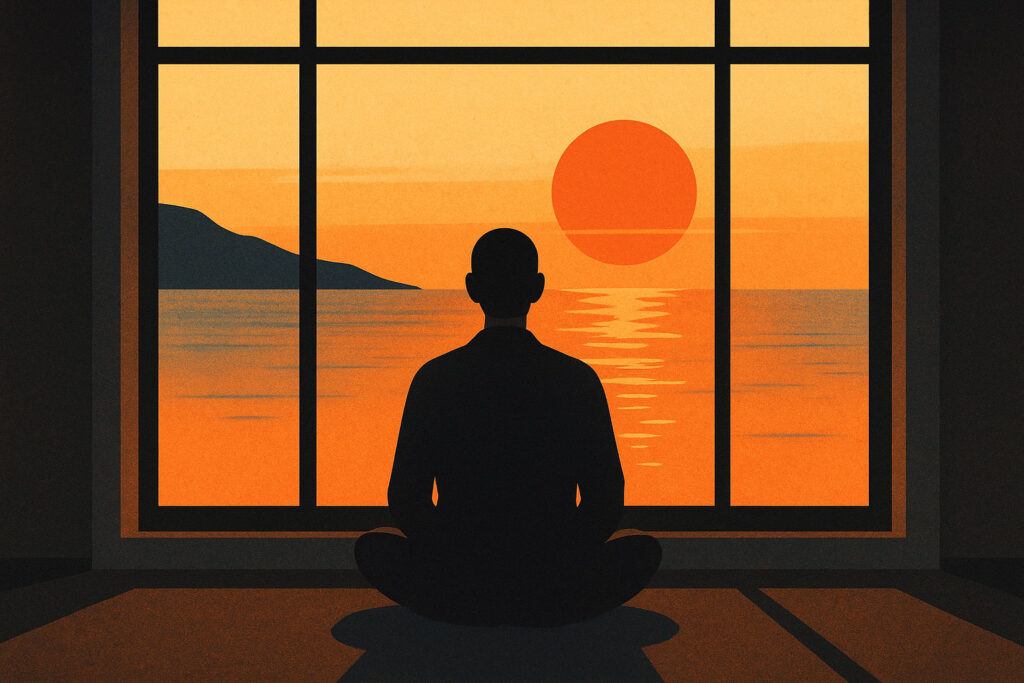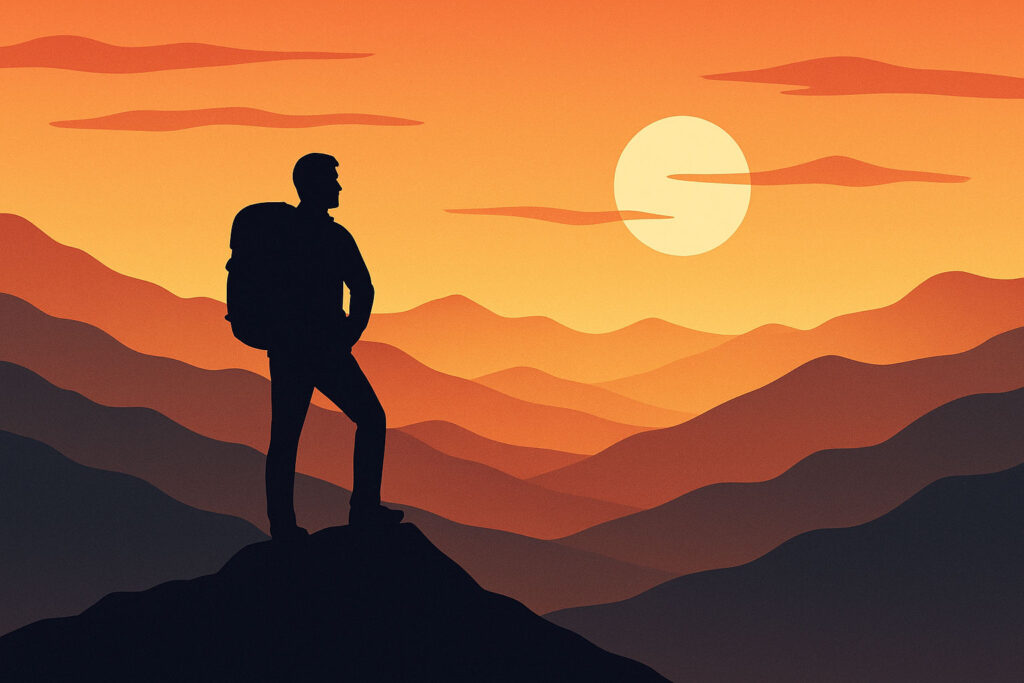
Breathing Your Way Back Home
A Buddhist parable of a blind turtle inspires reflection on life’s rarity, balancing samsara’s struggles with presence and spiritual homecoming.

There is a Buddhist story that is taught to illuminate the precious nature of life, it goes like this: If you were to merge all of the oceans into one great body of water; and a tiny wooden ring was floating on the vast expanse of all the oceans combined; and in the deepest depth of that vast ocean you placed a tiny blind turtle; and from that dark depth the turtle slowly swam to the surface of that vast ocean every 100 years; in the moment that it finally crested the surface, if the turtle somehow managed to poke it’s nose through the center of that tiny wooden ring, that is how rare it is for a human being to be born into this world; and also how rare it is to find the Buddhadharma.
So we’re picking up where we left off last week with Neruda’s notion of “the University of the waves,” and I will raise the ocean ante here with this story of the turtle. I can’t recall when I heard this story, but I think it was when I discovered the Tibetan Book of Living and Dying way back in the day. I loved the story then and I love it even more now. So this week’s meditation is on the notion of home, the precious nature of life and the dichotomy of spirit and ego.
As you know, this is where we reside: endlessly moving between two states of consciousness. On one hand, we have a deep, awakened, spiritual knowing that the experience of being human is unimaginably rare; and that our true spiritual homeland is not of this world. We have an intuitive sense, an awareness that something more profound—what the Tibetans refer to as Rigpa—lies in the primordial state of mind and can only be found in the eternal now, the present moment, the pure land.
And on the other hand, we are having this very human, ego experience. One where we have real homes, and jobs, and sex and money and families and bills and illness and death and wars and famine and hurricanes and music and laughter. Very human; very real. In Buddhist terms, this is the cycle of birth and death, the realm they call Samsara, where the illusion of a separate ego self is the source of most of human suffering.
So how do we deal with these two states? How do we break the spell? It all begins with awareness of these two states and then we find a practice that seeks to support our connection to an awakened, aware, presence. A renowned Tibetan Lama, Dilgo Khyentse Rinpoche said “When you recognize the empty nature of your mind, the confusion of samsara will subside. This is the true homecoming. Samsara is the mind running outwards, seeking something. Nirvana is the mind resting at ease in itself.”
There are many paths that can build a stronger connection to presence. But at the heart of any practice, the mission is very simple: get off of the thundering ego thought train, find your breath, come home and rest in the present moment, with deep gratitude for being alive and having this precious human experience.
So here is a suggestion to practice this week. Very simple. I am a big believer in a very practical, modern approach to meditation. In order to kick start it, just micro dose it. So what I do is just set a reminder on the phone that alerts me once in the morning and once at night. Add a mid-day reminder too if that sounds good. I have the reminder say, “Time to breathe and come home.” Choose a time slot that you usually or naturally would have 5 minutes to reset and breathe based on your usual schedule or daily rhythms. The more I do these short micro breathing resets that bring me home to the present moment, the more I find it’s an easy thing to reach for anytime I need to reconnect with my breath. With this simple daily practice, multiple times a day I stop and breathe, reset and come home to the present moment where everything and everyone awaits our return. Have a beautiful week my brotha.
Treading along in this dreamlike, illusory realm,
Without looking for the traces I may have left;
A cuckoo’s song beckons me to return home,
Hearing this, I tilt my head to see
Who has told me to turn back;
But do not ask me where I am going,
As I travel in this limitless world,
Where every step I take is my home.
-Dogen Zenji
(Japanese Zen Master 1200-1253)

A Buddhist parable of a blind turtle inspires reflection on life’s rarity, balancing samsara’s struggles with presence and spiritual homecoming.

Pablo Neruda’s “Keeping Quiet” teaches stillness amid chaos, reminding us that silence, breath, and presence restore peace and balance.

Inspired by Rory McIlroy’s Masters win and local golf struggles, this meditation explores resilience, nerves, and the courage to persevere.